Fever, also
called Pyrexia, is one of the most common presenting complaints in medical
practice. It is defined as a body temperature that is above the normal range
(for that individual) without any physiological cause to it (e.gtemperature
raise due to exercise or menstrual cycle doesn't count as fever). This is
usually above 38o C recorded by a thermometer(in this case, oral and rectal
temperature readings are more accurate than axillary temp). The most important
thing to keep in mind is that "fever" in it of itself is not a
disease, but rather a symptom that indicates an underlying disease process.

Mechanism of fever
Body temperature is usually set to its normal range by the hypothalamus (which acts as a sort of the thermostat). When the body suffers from certain pathological processes (namely "inflammation") certain chemicals are released by the body (collectively called pyrogens, e.g of which is interleukin-2). Pyrogens set the thermoregulatory point of the hypothalamus to a higher temperature, thus resulting in fever.
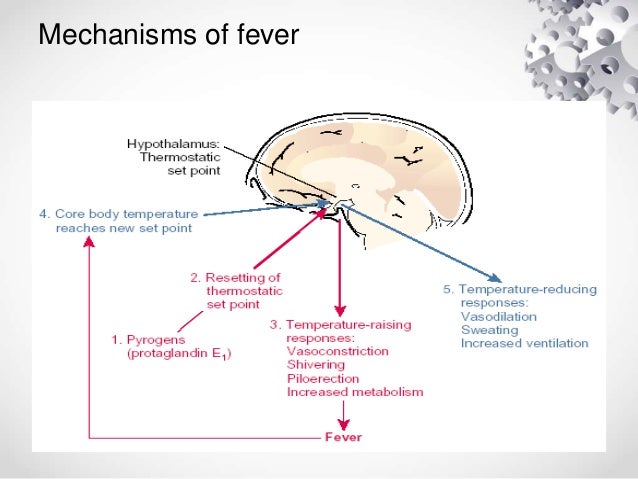
The causes of
fever can be divided into the broad categories of-
- Infections ( which is the most common cause of pyrexia. It can include bacterial, viral, fungal or parasitic infections),
- Clots
- Cancers,
- Auto-Immune diseases, and
- Miscellaneous(which can include things like heat stroke, medications, brain
lesions and thyroid storm to name a few).
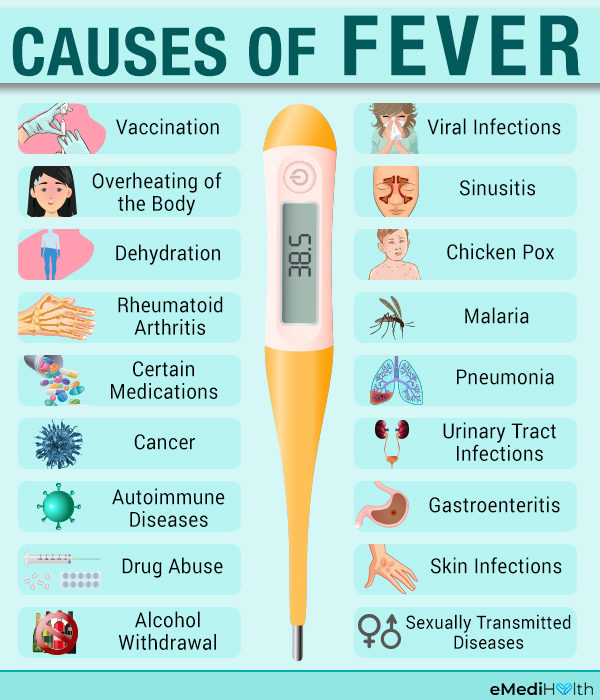
- Sweating.
- Chills and shivering.
- Headache.
- Muscle aches.
- Loss of appetite.
- Irritability.
- Dehydration.
- General weakness.
Diagnosing the cause of fever:
We have
mentioned 5 categories of diseases that usually result in fever, and each category consists of a multitude of possible diseases. In order to narrow down
our diagnosis, we need to do a thorough history and examination, and request
appropriate lab investigations where relevant. Fever is usually accompanied by
other symptoms as well which may guide the diagnosis of the underlying disease.
- General fever-related,
- Review of systems.
Fever specific questions include; the duration of fever, the timing of the fever (what time of day is it more prominent), the character(is it remitting or relapsing), Is it accompanied by chills or rigours? Is there night sweating? Is there weight loss? Is there pain anywhere? Review of systems is a systematic approach to identify accompanying symptoms in other body organs.
This is especially important in identifying the possible focus of infection. Ask relevant questions pertaining to each organ system and move from head to toe: so, for example, ask about headache, neck stiffness? eye pain? skin rashes or itching? runny nose, ear pain or discharge? Coughing, sputum, sore throat, pain on swallowing? Is there difficulty breathing or chest pain, is there any abdominal pain? Any change in bowel habits? Is there any lymph node enlargement? Any burning sensation while urinating? Any discharge from genitals? Any recent injuries? Any muscle or bone pain? Any recent surgery? Your history will be directed further by the patients' responses and will probably start moving towards a probable diagnosis.

Examine the relevant organ system in thorough detail. You mainly need to decide which of the 5 categories does the disease belong to, and which organ system is likely affected. For example, acute fever with a complaint of burning sensation during urination points to an Infection of the urinary tract, whereas chronic low-grade fever with anaemia and weight loss might be indicating haematological cancer.
Investigations.
When you have got narrowed down your focus within the history & examination, by thinking of probable diseases and excluding the unlikely causes, you'll advise certain investigations for the patient (if would like to be). Remember, it's good clinical unnecessary to avoid unessential investigations. Common investigations in fever include;
- complete blood count. The white blood cell count is raised in cases of infection.
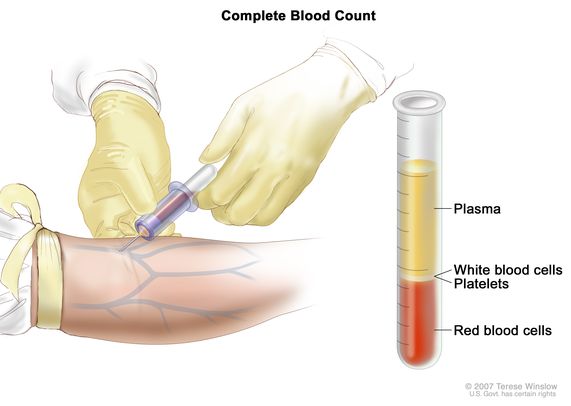
- Liver
function tests,

- urine routine examination,
/3156950_color-5ba560b4c9e77c008233667f.png)
- chest X-ray
Some diseases are common in certain areas, therefore investigations for them may be enclosed,
- e.g- PPD test for infectious disease & infectious agent Antibodies for liver disease.
- Cultures for urine, sputum, blood or pus could also be required in cases of bacterial infection, to spot the particular infectious agent. Red flags. Though many conditions will cause fever as mentioned before, however, some conditions are additional (serious) than others and need special attention.
- Neck stiffness, low GCS or acute neurological deficits.
- Severe chest pain.
- fast weight loss.
- Patient with a deadly look.
- respiratory distress.
- History of any recent surgical operation.
- A patient who is immunocompromised.
- high-risk behaviour including medication, and sexual promiscuity.
- History of visiting an epidemic space, and,
- if no obvious the cause is found for the fever at intervals three weeks, in the last case the situation, it becomes referred to as fever of unknown origin and needs intensive workup.
Febrile seizures. Some youngsters aged six months to five years might also have associated seizures with AN episode of fever. This might greatly worry the patients, and their folks, however, they ought to be confident that symptom seizures are largely harmless and don't harm the brain. Just in case the symptom seizures aren't being controlled, consult with paediatricians.
Treatment.
Definitive treatment of the fever lies in treating the underlying cause. In most cases it's AN infection, therefore the correct anti-microbial drug ought to be prescribed. WARNING: don't use antibiotics without any correct prescription, or use but the prescribed amount as these results in antibiotic resistance leading to tougher infections. For symptomatic relief of fever, non-steroidal anti-inflammatory medication (e.g Ibuprofen), or Paracetamol could also be used. These give solely temporary relief from fever.
Please note that no medications are free from side effects, and it's higher to avoid taking any medication with none valid reason.
Home remedies-
- Sit in a bath of lukewarm water, which will feel cool when you have a fever.
- Give yourself a sponge bath with lukewarm water.
- Wear light pyjamas or clothing.
- Try to avoid using too many extra blankets when you have chills.
- Drink plenty of cool or room-temperature water.
- Eat popsicles.
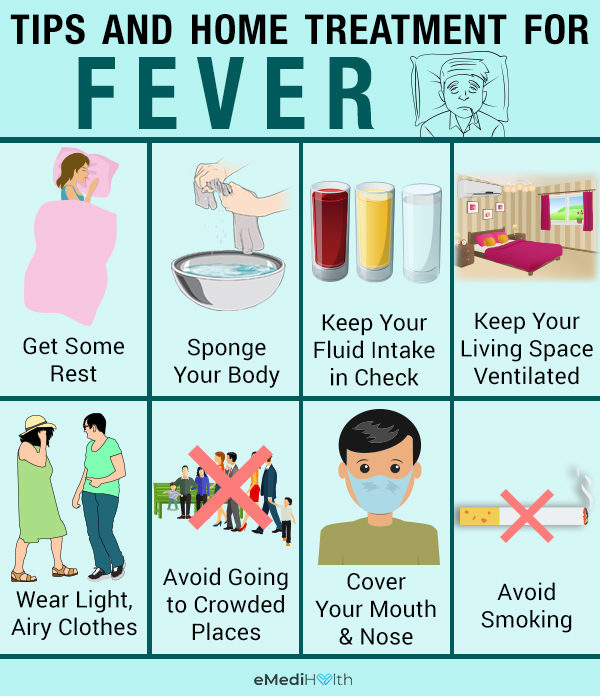
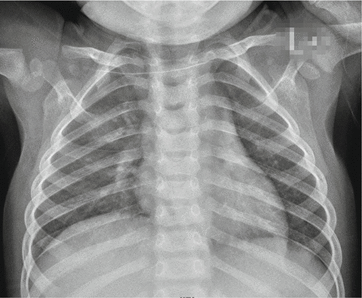
Comments
Post a Comment
If you have any doubt, feel free to comment.